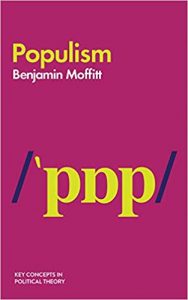Book Review | Populism by Benjamin Moffitt
In Populism, Benjamin Moffitt offers a new study that looks to assess the current state of scholarship on populism. Going a significant way to providing the clarity that can be so lacking when it comes to understanding populism, this is an essential textbook that Jake Scott recommends to anyone looking for an entry into the field.

Picture: Gerd Altmann from Pixabay
Populism. Benjamin Moffitt. Polity. 2020.

When the editors of The Oxford Handbook of Populism (2017) remarked that it was just as important to know what populism is not as what it is, it seems that Benjamin Moffitt took note. At a time when the term ‘populism’ is increasingly used both inside the academy and out – in 1998, there were 300 Guardian articles that mentioned the term ‘populism’; by 2016 that number was 2,000 – clarity is greatly in demand. Indeed, the field appears so broad and so daunting that it is hard to blame most people for conceptual confusion and the perception that the topic remains impenetrable.
Fortunately, Moffitt’s book goes a significant way towards providing the clarity that is so lacking. Populism is structured in a very sensible and appealing manner, such that the chapters can be grouped into three pairs: ‘Why Populism Matters’ and ‘What is Populism?’; followed by ‘Populism, Nationalism and Nativism’ and ‘Populism and Socialism’; concluding with ‘Populism and Liberalism’ and ‘Populism and Democracy’, the latter of which addresses the question that all discussions on populism (seemingly) circle back to. It is here Moffitt remarks that Nadia Urbinati’s 1998 proclamation that ‘the debate over the meaning of the term populism turns out to be a debate over the interpretation of democracy’ remains most salient (111). Before this final chapter, however, Moffitt walks the reader through the current literature on the populist phenomena with remarkable breadth and efficiency.
The first chapter, ‘Why Populism Matters’, sets the scene, commenting on both the academic field and the broader public’s primarily media-led perceptions of populism, before turning in Chapter Two, ‘What is Populism?’, to the current state of the literature. From the outset, Moffitt makes it clear he is not attempting a new definition or theory, but rather ‘a concise account of contemporary approaches to populism, mapping conceptual debates about what populism ‘‘is’’, delineating the different theoretical traditions used to approach the concept’ (3). Of these theoretical traditions, Moffitt (correctly) identifies the three most prevalent to be the ideational approach (12); the strategic approach (17); and what he terms the discursive-performative approach (21). It is in this final group that Moffitt positions himself, though he continues throughout the book to primarily consider the first and third groups’ perspectives. Curiously, Moffitt does seem to relegate the strategic approach to the sideline, which feels all the more odd given the focus of Chapters Three and Four (discussed below).
Concluding the second chapter, and despite his own position, Moffitt compares the three approaches and their main foci, identifying their points of agreement and disagreement in a balanced manner such that he can confidently assert that ‘hackneyed arguments about scholars of populism not agreeing on anything need to be thrown out the door: they are simply not true’ (28). Despite the book’s overall significance, I think this intervention is Moffitt’s most important: the supposed impenetrability of the current literature largely comes from the misperception that there remains no consensus on the topic at all. Moffitt expertly dismisses this fallacy, whilst pointing out that consensus remains thin: it exists insofar as scholars of populism agree on the existence of certain elements in populism, yet disagree on the importance, salience or prioritisation of these.
Turning then to the most common phenomenon associated with populism, the chapter entitled ‘Populism, Nationalism and Nativism’ begins by making the obvious, but obviously necessary, point that populism is not nationalism, whilst also making reference to the literature’s common conflation of the two (for instance, Roger Eatwell and Matthew Goodwin’s 2018 book National Populism and the Revolt Against Liberal Democracy). Most significantly, Moffitt tackles the implicit assumption that nationalism is solely a right-wing phenomenon, illustrating how left-wing populisms have appealed to a conception of the nation as an organising concept. However, as the chapter title suggests, Moffitt elaborates on this by distinguishing a particular ethnic nationalism used by populists on the right (such as Viktor Orbán, Osamu Fujimora and Nigel Farage) as ‘nativist populism’, while using civic nationalism to describe that used by the left (such as Hugo Chavèz, Evo Morales and the Spanish political party Podemos). Importantly, Moffitt also considers sub-national and intranational populisms, such as the DiEM25 (Democracy in Europe Movement 2025, led by Yanis Varoufakis), thereby highlighting the limiting consequence of focusing only on nation-level populisms.
In the penultimate chapter, ‘Populism and Liberalism’, Moffitt considers the right- and left-wing populist approaches to liberalism to respond to the key narrative that populism is ‘a threat to democracy’ (71). Here Moffitt distinguishes between three types of liberalism – ‘Lockean’, ‘Kantian’ and ‘Millian’ – to judge the extent to which populism might be ‘liberal’. To this end, Moffitt strips back right-wing populism’s ‘lip-service’ to liberalism as a way of veiling an illiberal commitment to prejudice and exclusionary politics, while noting that left-wing populists offer a more sincere belief in the ideas of liberalism, but reveals that in practice their results are ‘at best, mixed’ (86).
The closing chapter, ‘Populism and Democracy’, offers a particularly revealing insight: that theorists’ use and conception of ‘populism’ often reveals their own epistemological and normative commitments. Moffitt contrasts two approaches to democracy and associated thinkers: the ‘liberal side’, with thinkers such as Jan-Werner Müller, Urbinati, Yascha Mounk and Stefan Rummens; and the ‘radical side’, propagated most by Ernesto Laclau and Chantal Mouffe. By bifurcating the field in this manner, Moffitt helps us to understand why some theorists consider populism to be significant and how it behaves with democracy, with the ‘liberals’ fearful of the authoritarian temptation in populism and the threat it poses to institutional democracy, while the ‘radicals’ see populism as a potentially reinvigorating force capable of ending the dominance of technocrats and opening democracy up to a truly pluralistic practice.
My only criticism of this final chapter is that there is a certain indebtedness to Carl Schmitt and his criticism of ‘liberal democracy’ as two contradictory philosophies forced together through the particular development in Western (especially European) politics (see, for instance, Richard Bellamy and Peter Baehr’s 2014 paper Carl Schmitt and the Contradictions of Liberal Democracy). However, Moffitt makes mention of Schmitt only once; even then, it is in a passing comment on his friend-and-enemy distinction to introduce the difference between antagonism and agonism (97). For anyone unfamiliar with Schmitt, this brief mention is likely to hamper the primary goal of the book – that of clarity. This is only a minor note, and in no way undermines Moffitt’s observations in these chapters.
Ultimately, what Moffitt has written is an essential textbook on the topic of populism with regards to two key areas: the current state of the literature and the definitional haziness of the concept itself. If anyone is looking for an entry into the field, they can do no better than to start with this book.
This review gives the views of the author, and not the position of Democratic Audit. It was first published by the LSE Review of Books blog.
About the author
Jake Scott is a Doctoral Researcher at the University of Birmingham, looking at political theories of populism. His research specialities include ideology, conservatism, post-Marxism, and the history of political thought. He is the editor of online blog The Mallard.





 Democratic Audit's core funding is provided by the Joseph Rowntree Charitable Trust. Additional funding is provided by the London School of Economics.
Democratic Audit's core funding is provided by the Joseph Rowntree Charitable Trust. Additional funding is provided by the London School of Economics.